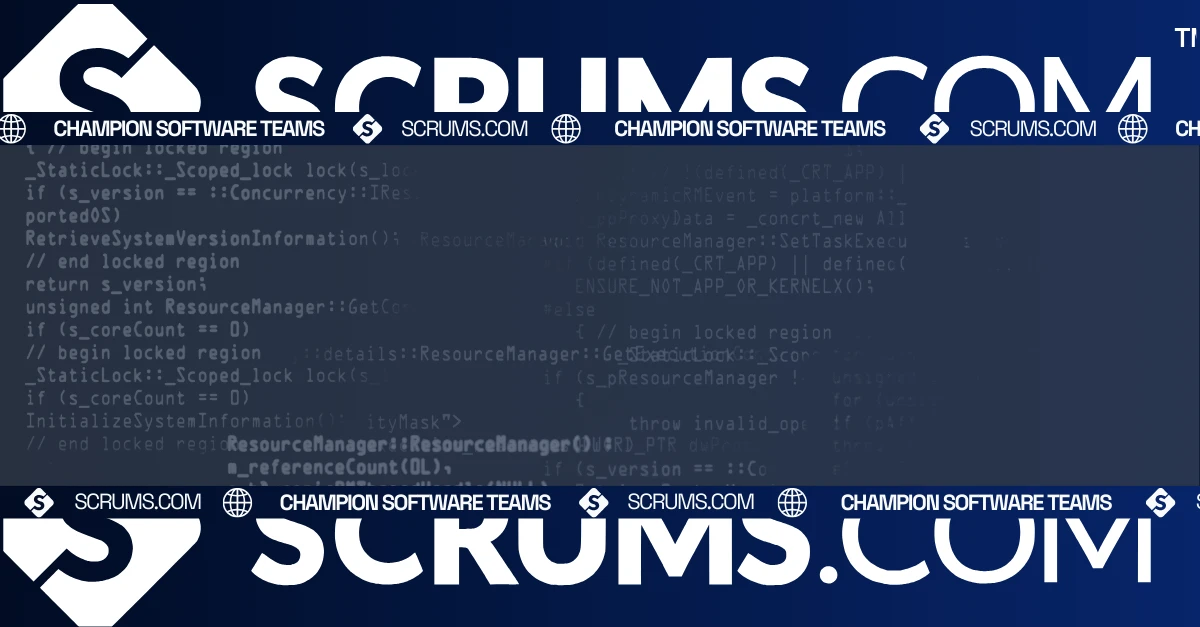Hire Fortran software developers
Scrums.com's 10,000+ software developer talent pool includes experts across a wide array of software development languages and technologies giving your business the ability to hire in as little as 21-days.







































Years of Service
Client Renewal Rate
Vetted Developers
Ave. Onboarding
Africa Advantage
Access world-class developers at 40-60% cost savings without compromising quality. Our 8,500+ talent pool across Africa delivers enterprise-grade engineering with timezone overlap for US, UK, and EMEA markets.
AI-Enabled Teams
Every developer works within our AI-powered SEOP ecosystem, delivering 30-40% higher velocity than traditional teams. Our AI Agent Gateway provides automated QA, code reviews, and delivery insights.
Platform-First Delivery
Get real-time development visibility into every sprint through our Software Engineering Orchestration Platform (SEOP). Track velocity, blockers, and delivery health with executive dashboards.
Align
Tell us your needs
Book a free consultation to discuss your project requirements, technical stack, and team culture.
Review
We match talent to your culture
Our team identifies pre-vetted developers who match your technical needs and team culture.
Meet
Interview your developers
Meet your matched developers through video interviews. Assess technical skills and cultural fit.
Kick-Off
Start within 21 days
Developers onboard to SEOP platform and integrate with your tools. Your first sprint begins.
Don't Just Take Our Word for It
Hear from some of our amazing customers who are building with Scrums.com Teams.
Flexible Hiring Options for Every Need
Whether you need to fill developer skill gaps, scale a full development team, or outsource delivery entirely, we have a model that fits.
Augment Your Team
Embed individual developers or small specialist teams into your existing organization. You manage the work, we provide the talent.
Dedicated Team
Get a complete, self-managed team including developers, QA, and project management – all orchestrated through our SEOP platform.
Product Development
From discovery to deployment, we build your entire product. Outcome-focused delivery with design, development, testing, and deployment included.
Access Talent Through The Scrums.com Platform
When you sign-up to Scrums.com, you gain access to our Software Engineering Orchestration Platform (SEOP), the foundation for all talent hiring services.
View developer profiles, CVs, and portfolios in real-time
Activate Staff Augmentation or Dedicated Teams directly through your workspace

Need Software Developers Fast?
Deploy vetted developers in 21 days.
Tell us your needs and we'll match you with the right talent.
What is Fortran and Why It Matters for Your Business
Fortran (FORmula TRANslation) is one of the oldest high-level programming languages, originally developed in the 1950s for scientific and engineering computations. Known for its efficiency in numerical analysis and high-performance computing (HPC), Fortran remains widely used in fields such as scientific research, engineering, and meteorology. According to IEEE Spectrum, Fortran consistently ranks as one of the top languages in scientific computing, particularly in industries that require precision and computational power.
Hiring a Fortran developer is essential for businesses focused on scientific computing, weather modeling, and other performance-critical applications. Fortran’s ability to handle complex numerical calculations with high efficiency makes it a valuable tool for industries relying on advanced simulations and data analysis.
Key Benefits of Hiring a Fortran Developer
Hiring a Fortran developer offers several unique advantages, especially for businesses involved in scientific research, engineering, and high-performance simulations. Key benefits include:
- High-Performance Simulations: Fortran is optimized for handling large-scale simulations that require significant computational power. Fortran developers can create efficient code for simulations in fields such as physics, chemistry, and engineering, making it ideal for projects like fluid dynamics, structural analysis, and weather modeling.
- Precision in Numerical Analysis: Fortran’s strength lies in its ability to perform precise numerical computations. Fortran developers are skilled in writing programs that perform highly accurate calculations, ensuring the reliability of results in scientific and engineering applications.
- Efficiency in Scientific Computing: Fortran developers are experts in scientific computing and can leverage the language’s efficiency to handle massive datasets and run simulations faster than other languages like Python or MATLAB. This is crucial for industries that require real-time analysis and data processing.
- Legacy System Maintenance: Fortran is still widely used in legacy systems across many industries. Fortran developers can maintain and update these systems, ensuring that they remain functional while integrating with modern technologies.
- Parallel Computing for Speed: Fortran’s modern extensions support parallel computing, allowing developers to split computational tasks across multiple processors. This dramatically reduces the time required for complex simulations, making it ideal for weather forecasting, ocean modeling, and aerospace applications.
Core Competencies of a Skilled Fortran Developer
When hiring a Fortran developer, it’s important to ensure they have the necessary skills and expertise to handle complex scientific and engineering projects. Key competencies include:
- Proficiency in Fortran Programming: A skilled Fortran developer should have a deep understanding of the language, including its modern versions like Fortran 90, 95, 2003, and beyond. They should be proficient in writing efficient and optimized code for scientific and numerical computations.
- Experience with High-Performance Computing (HPC): Fortran developers should have experience working with high-performance computing environments, including parallel processing and GPU computing. This is essential for running large-scale simulations that require significant computational resources.
- Numerical Analysis and Mathematical Expertise: A good Fortran developer should have a strong foundation in mathematics, particularly in areas like numerical analysis, linear algebra, and differential equations. This is crucial for developing software that performs accurate and reliable calculations.
- Simulation and Modeling Skills: Fortran developers should be experienced in creating simulations and models for scientific and engineering applications. This includes working with libraries and frameworks that enhance Fortran’s capabilities in these areas.
- Legacy System Maintenance and Modernization: Many industries still rely on legacy Fortran systems. A competent Fortran developer should be skilled in maintaining, updating, and modernizing these systems while ensuring compatibility with modern platforms.
How Fortran is Used in Modern Software Development
Despite its age, Fortran remains highly relevant in certain sectors of modern software development. Here are some of the common uses of Fortran today:
- Scientific Computing and Research: Fortran is still widely used in scientific computing for tasks such as modeling physical processes, performing numerical simulations, and solving complex mathematical problems. For example, it is frequently employed in research projects that involve climate modeling, ocean simulations, and molecular dynamics.
- Engineering Software Development: Fortran is often used in engineering fields like civil, mechanical, and aerospace engineering. Fortran developers build simulations and software tools that perform structural analysis, fluid dynamics modeling, and thermodynamic calculations.
- Weather Modeling and Meteorology: Fortran is a popular language for developing weather models due to its ability to handle the massive datasets required for accurate predictions. Organizations like NASA and NOAA rely on Fortran-based software for weather forecasting and climate simulations.
- Numerical Analysis in Finance: Fortran is also used in financial services, particularly for quantitative analysis, risk modeling, and forecasting. Its precision in handling complex numerical calculations makes it suitable for financial simulations and market analysis.
- Legacy Systems in Government and Industry: Many government agencies, including those in aerospace and defense, still rely on Fortran for mission-critical software. Fortran developers are often needed to maintain and update these legacy systems to ensure they continue to function efficiently.
Fortran vs. Other Programming Languages: When to Choose Fortran for Your Project
Choosing the right programming language is essential for the success of your project. Here’s how Fortran compares to other languages like Python, C, and MATLAB, and when it might be the best choice:
- High-Performance Computing: Fortran is specifically designed for high-performance computing (HPC) and outperforms general-purpose languages like Python in terms of computational speed and efficiency. If your project involves large-scale simulations or complex numerical analysis, Fortran is the superior choice.
- Numerical Precision: Compared to languages like C and Python, Fortran offers superior precision for numerical computations. This makes it ideal for scientific and engineering projects that require accurate and reliable results.
- Parallel Processing: While languages like Python and MATLAB can handle parallel processing through libraries, Fortran’s native support for parallelism makes it a more efficient choice for large-scale simulations that need to run across multiple processors.
- Legacy Systems and Long-Term Support: Fortran has been in use for decades, and many industries still rely on Fortran-based legacy systems. If your project involves maintaining or modernizing legacy systems, hiring a Fortran developer is essential for ensuring long-term support and stability.
- Scientific Libraries and Tools: Fortran has a rich ecosystem of scientific libraries and tools, such as LAPACK, BLAS, and OpenMP, which make it easier to develop high-performance scientific applications. These tools are often more mature and optimized for performance compared to equivalent libraries in Python or C.
The Future of Fortran Development: Trends and Insights
Despite being a legacy language, Fortran continues to evolve and find relevance in modern development, especially in fields like high-performance computing and scientific research. Here are some trends highlighting the future of Fortran development:
- Integration with Modern Technologies: Fortran is being integrated with modern technologies such as cloud computing, GPU acceleration, and big data analytics. This allows Fortran developers to take advantage of modern hardware while continuing to use Fortran’s efficient numerical processing capabilities.
- Expansion in High-Performance Computing (HPC): With the rise of exascale computing, Fortran remains a dominant language in the HPC community. Its role in powering simulations and models in physics, climate science, and aerospace is growing, with more organizations seeking Fortran developers for HPC projects.
- Enhanced Support for Parallel Computing: Fortran’s support for parallel computing continues to improve, making it an attractive choice for businesses that require fast, efficient processing of large datasets. As multi-core processors and GPUs become more prevalent, Fortran’s ability to take full advantage of parallelism will keep it relevant in scientific computing.
- Continued Use in Government and Academia: Fortran is still widely taught in academia and used by government research institutions for scientific and engineering applications. As these sectors continue to require high-precision computing, the demand for Fortran developers will persist.
- Cross-Platform and Modernization Tools: Modern Fortran compilers now support cross-platform development and interoperability with languages like C and Python. This is expanding the range of applications where Fortran can be used, ensuring its ongoing relevance in hybrid and multi-language development environments.
How to Hire the Right Fortran Developer for Your Needs
Hiring the right Fortran developer is crucial to the success of your scientific computing or engineering project. Here’s how to get started:
- Define Your Project Requirements: Clearly outline your project’s scope, including whether you need expertise in scientific simulations, numerical analysis, or legacy system maintenance. This will help you identify developers with the right skills.
- Look for Relevant Experience: Choose developers with proven experience in Fortran development, particularly those who have worked on high-performance computing, engineering simulations, or weather modeling. Experience with modern Fortran versions and parallel processing is highly valuable.
- Evaluate Technical Skills: Ensure the developer has strong Fortran coding skills, knowledge of mathematical algorithms, and experience in handling large datasets. They should also be familiar with scientific libraries like LAPACK and BLAS.
- Assess Communication and Collaboration: Your Fortran developer should be able to communicate effectively and collaborate well with your team, especially when working on complex simulations or integrating with modern technologies.
- Consider Freelancers or Development Agencies: Depending on the size and complexity of your project, you may opt to hire a freelance Fortran developer or work with a development agency specializing in scientific computing. Each option offers unique advantages, so choose based on your needs and budget.
Find Related Software Developer Technologies
Caliiburn Micro developers
.NET Core developers
C developers
C# Developers
C++ developers
Explore Software Development Blogs
The most recent trends and insights to expand your software development knowledge.















